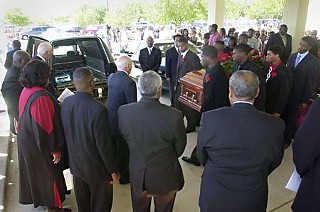Naked City
News briefs from Austin, the region, and beyond
Fri., May 22, 2009

• If She Can't Have It, Nobody Can We've joked that recent mayoral candidate Carole Keeton Strayhorn is the hockey-masked/razor-fingered slasher of Texas politics, but maybe the conspiracy-crazed Angels & Demons domain is more her speed: Last week, Strayhorn adviser Mark Sanders publicly questioned the validity of Mayor-elect Lee Leffingwell's election after Brewster McCracken dropped out of the run-off. As reported in a blog post from the McCracken-endorsing Austin-American Statesman, Sanders felt that because Leffingwell had not procured an outright majority of the vote – 50% or more – the election violated a 2001 revision to Article 11, Section 11, of the Texas Constitution stating that council members serving two- to four-year terms must be elected "by majority vote of the qualified voters." (Strayhorn distanced herself from the charges, telling the daily, "The campaign is over.") Sanders depicted the Leffingwell win as setting a local precedent, ignoring the fact that in 2002, Betty Dunkerley joined City Council after opponent Beverly Griffith bowed out from a run-off. The Statesman depicted Leffingwell's election as a blue-dog conspiracy, helpfully noting that County Attorney David Escamilla and District Attorney Rosemary Lehmberg – who possibly might inveigh on the matter – "are Democrats, as is Leffingwell." Oh my God, that means practically the whole city's in on it! – Wells Dunbar
• Budget By the People The city wrapped up presentations this week to more than 20 boards and commissions on the upcoming city budget. Involving citizen boards in the annual budget preparation process – well before final budget adoption in September – is part of a new outreach initiative by City Manager Marc Ott, who wrote in a recent memo to City Council, "Austinites love the services that the city provides, and nearly everything we do has a constituency that will vocally defend it." He also added, "I believe that this open process is the right thing to do, but it will also likely be messy." Along with the boards and commissions presentations, the process includes town hall meetings, a citizen survey that concluded May 11, and meetings with the Chamber of Commerce and the Neighborhoods Council (a series of citizen focus groups to be held in June has been canceled due to cost). The results of the citizen survey will be presented to council June 11, along with a General Fund forecast; a proposed budget goes to council July 22. For more information, see www.cityofaustin.org/budget. – Katherine Gregor

• Ladies' Night, Oh what a Night Austin Police say a band of thieving females on the prowl in the East Sixth Street entertainment district has allegedly drugged two men and then stolen their credit cards. Both victims reported waking the next day with little memory of what happened the night before – aside from being separated from friends, picked up by three or four women, and driven away from Downtown in a sport utility vehicle or van. Police believe they're looking for four African-American females who were caught on camera using the stolen cards at an ATM. Anyone with info about the heists should call APD's Financial Crimes Unit at 974-5290 or Crime Stoppers at 472-8477. – Jordan Smith
Dirt Hits Fan on Downtown Plan
Fireworks flew Monday when two key recommendations for the Downtown Austin Plan – on affordable housing and a density-bonus system to help pay for it – were presented at a town hall meeting. In providing comprehensive policy recommendations, representatives from ROMA Austin and subconsultant HR&A Advisors urged Austin to get more aggressive, expand its financing tool kit, and establish a new housing corporation in order to build both very low-income and more median-income work force housing. Due to higher land and other costs in the Central Business District, the consultants recommended a policy of pursuing primarily work force housing (which requires less substantial subsidies) Downtown. Housing to serve the lowest-income households requires deeper subsidies; some of the money would come from a special fund, stoked by a density-bonus system. To help as many Austinites as possible, the consultants recommended building the housing where the dirt is less dear – in Central Austin neighborhoods linked by transit to Downtown. In response, neighborhood activist Jeff Jack had sent out an alarmist and inaccurate missive to the Austin Neighborhoods Council listserv before the meeting, headlined "Is your neighborhood about to become 'Downtown'?" That turned out an ANC crowd panicked by fears of greater density in its back yard. HR&A principal John Alschuler repeatedly assured those concerned that neighborhoods surrounding Downtown were recommended as beneficiaries of the affordable housing fund only, not for greater density. When Jack accused Alschuler of misleading the audience, the New Yorker reacted sharply: "To impugn my motives is not appropriate! Let's keep the conversation civil!" To understand what all the excitement was about, read the two sobering, in-depth studies posted at www.cityofaustin.org/downtown. – K.G.
Where the Stimulus Is Going
A fight over federal stimulus dollars came to City Council last week. At issue was how to spend $2 million of stimulus money in the form of Community Development Block Grants. City staff recommended that the funds go primarily to three new developments: $500,000 for LifeWorks' East Austin Youth and Family Resource Center, $500,000 for the PeopleFund's Center for Economic Opportunity, and $550,000 to create an African-American Cultural and Heritage Facility, along with $250,000 for new sidewalks in East Austin. The recommendations ran counter to the city's Community Development Commission, which recommended $1.55 million of the funds be used by the Austin Area Urban League and city departments to make emergency home repairs for poverty-stricken Austinites. Several commissioners came to speak; part of their anger stemmed from the fact that bond dollars approved by voters in 2006 for affordable housing were not allowed for home repair until recently, an oversight that Neighborhood Housing and Community Development Director Margaret Shaw apologized for. Council did more than apologize, though; while passing the stimulus funding as recommended by staff, it also approved a $2 million, bond-funded expansion to the city's home-repair program. – Wells Dunbar
Got something to say on the subject? Send a letter to the editor.






